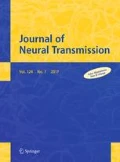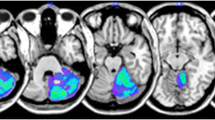Abstract
Because the cerebellum plays a role in motor coordination, timing, sequencing, and feedback, it is hypothesized to be involved in swallowing-related functions. The role of the cerebellum in deglutition has become increasing evident, but the exact nature of this role remains inconclusive because of limited data from pure cerebellar lesions. Therefore, we conducted location analysis in isolated cerebellar lesions to complement previous findings and provide additional information. We reviewed 40 stroke patients with isolated cerebellar lesion. Lesion location and volume were measured on brain magnetic resonance images. We generated statistical maps of lesions related to VDS using voxel-based lesion symptom mapping (VLSM). We also created an overlay map of subgroups according to VDS score, those who have low risk and those who have high risk. Patients with cerebellar lesion had difficulty swallowing, both in the oral and pharyngeal phases. Multivariate analysis of cognitive function was selected as an independent predictor. In the group of high-risk patients, the overlay map showed some bilateral asymmetry, with a wider distribution in the left hemisphere and involvement of deep cerebellar nuclei. Using VLSM, we found that lesion location was associated with dysphagia. Although these results were not statistically significant, they showed a lesion pattern with predominant distribution in the left posterior lobe. Our results suggest that damage to the posterior lobe of the left cerebellum tends be related to severity of dysphagia in patients with isolated cerebellar lesion.



Similar content being viewed by others
References
Alberts MJ, Horner J, Gray L, Brazer SR (1992) Aspiration after stroke: lesion analysis by brain MRI. Dysphagia 7(3):170–173. https://doi.org/10.1007/BF02493452
Almotairi FS, Andersson M, Andersson O, Skoglund T, Tisell M (2018) Swallowing dysfunction in adult patients with chiari I malformation. J Neurol Surg B Skull Base 79(6):606–613. https://doi.org/10.1055/s-0038-1655758
Bates E, Wilson SM, Saygin AP, Dick F, Sereno MI, Knight RT, Dronkers NF (2003) Voxel-based lesion-symptom mapping. Nat Neurosci 6(5):448–450. https://doi.org/10.1038/nn1050
Berl MM, Mayo J, Parks EN, Rosenberger LR, VanMeter J, Ratner NB, Vaidya CJ, Gaillard WD (2014) Regional differences in the developmental trajectory of lateralization of the language network. Hum Brain Mapp 35(1):270–284. https://doi.org/10.1002/hbm.22179
Berntson GG, Potolicchio SJ Jr, Miller NE (1973) Evidence for higher functions of the cerebellum: eating and grooming elicited by cerebellar stimulation in cats. Proc Natl Acad Sci U S A 70(9):2497–2499. https://doi.org/10.1073/pnas.70.9.2497
Brunker C, Shah S (2001) Systems and diseases. Exploring normal anatomy and physiology. Nervous system 11: Brain tumours. Nurs times 97(26):43–46
Dehaghani SE, Yadegari F, Asgari A, Chitsaz A, Karami M (2016) Brain regions involved in swallowing: evidence from stroke patients in a cross-sectional study. J Res Med Sci 21:45. https://doi.org/10.4103/1735-1995.183997
Fernandez-Pombo A, Seijo-Raposo IM, Lopez-Osorio N, Canton-Blanco A, Gonzalez-Rodriguez M, Arias-Rivas S, Rodriguez-Yanez M, Santamaria-Nieto A, Diaz-Ortega C, Gomez-Vazquez E, Martinez-Olmos MA (2019) Lesion location and other predictive factors of dysphagia and its complications in acute stroke. Clin Nutr Espen 33:178–182. https://doi.org/10.1016/j.clnesp.2019.05.019
Flowers HL, Skoretz SA, Streiner DL, Silver FL, Martino R (2011) MRI-based neuroanatomical predictors of dysphagia after acute ischemic stroke: a systematic review and meta-analysis. Cerebrovasc Dis 32(1):1–10. https://doi.org/10.1159/000324940
Gaser C, Schlaug G (2003) Brain structures differ between musicians and non-musicians. J Neurosci 23(27):9240–9245
Grabski K, Lamalle L, Vilain C, Schwartz JL, Vallee N, Tropres I, Baciu M, Le Bas JF, Sato M (2012) Functional MRI assessment of orofacial articulators: neural correlates of lip, jaw, larynx, and tongue movements. Hum Brain Mapp 33(10):2306–2321. https://doi.org/10.1002/hbm.21363
Han TR, Paik NJ, Park JW, Kwon BS (2008) The prediction of persistent dysphagia beyond six months after stroke. Dysphagia 23(1):59–64. https://doi.org/10.1007/s00455-007-9097-0
Hirano M, Hatzoglou V, Karimi S, Young RJ (2015) Hypertrophic olivary degeneration resulting from posterior fossa masses and their treatments. Clin Imaging 39(5):787–790. https://doi.org/10.1016/j.clinimag.2015.05.015
Hoche F, Guell X, Vangel MG, Sherman JC, Schmahmann JD (2018) The cerebellar cognitive affective/Schmahmann syndrome scale. Brain 141(1):248–270. https://doi.org/10.1093/brain/awx317
Hu D, Shen H, Zhou Z (2008) Functional asymmetry in the cerebellum: a brief review. Cerebellum 7(3):304–313. https://doi.org/10.1007/s12311-008-0031-2
Ickenstein GW, Hohlig C, Prosiegel M, Koch H, Dziewas R, Bodechtel U, Muller R, Reichmann H, Riecker A (2012) Prediction of outcome in neurogenic oropharyngeal dysphagia within 72 hours of acute stroke. J Stroke Cerebrovasc Dis 21(7):569–576. https://doi.org/10.1016/j.jstrokecerebrovasdis.2011.01.004
Isono C, Hirano M, Sakamoto H, Ueno S, Kusunoki S, Nakamura Y (2013) Differences in dysphagia between spinocerebellar ataxia type 3 and type 6. Dysphagia 28(3):413–418. https://doi.org/10.1007/s00455-013-9450-4
Jayasekeran V, Rothwell J, Hamdy S (2011) Non-invasive magnetic stimulation of the human cerebellum facilitates cortico-bulbar projections in the swallowing motor system. Neurogastroenterol Motil 23(9):831-e341. https://doi.org/10.1111/j.1365-2982.2011.01747.x
Jernigan TL, Gamst AC, Fennema-Notestine C, Ostergaard AL (2003) More “mapping” in brain mapping: statistical comparison of effects. Hum Brain Mapp 19(2):90–95. https://doi.org/10.1002/hbm.10108
Kim J, Oh BM, Kim JY, Lee GJ, Lee SA, Han TR (2014) Validation of the videofluoroscopic dysphagia scale in various etiologies. Dysphagia 29(4):438–443. https://doi.org/10.1007/s00455-014-9524-y
Kim NY, Lee SC, Shin JC, Park JE, Kim YW (2017) Voxel-based lesion symptom mapping analysis of depressive mood in patients with isolated cerebellar stroke: a pilot study. Neuroimage Clin 13:39–45. https://doi.org/10.1016/j.nicl.2016.11.011
Lapa S, Quick-Weller J, Nasari C, Dziewas R, Gessler F, Wagner M, Warnecke T, Hattingen E, Seifert V, Konczalla J (2020) Pre- and post-surgical dysphagia in adults with tumors of the posterior fossa: a prospective blinded study. Cancers. https://doi.org/10.3390/cancers12092561
Lee HH, Seo HG, Kim KD, Lee SH, Lee WH, Oh BM, Lee WW, Kim Y, Kim A, Kim HJ, Jeon B, Han TR (2018) Characteristics of early oropharyngeal dysphagia in patients with multiple system atrophy. Neurodegener Dis 18(2–3):84–90. https://doi.org/10.1159/000487800
Lee S, Moon HI, Shin JH (2021) Post-stroke palatal tremor as a clinical predictor of dysphagia and its neuroanatomical correlates in patients with midbrain and pontine lesions. J Neural Transm. https://doi.org/10.1007/s00702-021-02417-w
Lisander B, Martner J (1975) Effects on gastric motility from the cerebellar fastigial nucleus. Acta Physiol Scand 94(3):368–377. https://doi.org/10.1111/j.1748-1716.1975.tb05896.x
Logemann JA, Boshes B, Blonsky ER, Fisher HB (1977) Speech and swallowing evaluation in the differential diagnosis of neurologic disease. Neurol Neurocir Psiquiatr 18(2–3 Suppl):71–78
Maintz JB, Viergever MA (1998) A survey of medical image registration. Med Image Anal 2(1):1–36. https://doi.org/10.1016/s1361-8415(01)80026-8
Malandraki GA, Sutton BP, Perlman AL, Karampinos DC, Conway C (2009) Neural activation of swallowing and swallowing-related tasks in healthy young adults: an attempt to separate the components of deglutition. Hum Brain Mapp 30(10):3209–3226. https://doi.org/10.1002/hbm.20743
Marien P, van Dun K, Verhoeven J (2015) Cerebellum and apraxia. Cerebellum 14(1):39–42. https://doi.org/10.1007/s12311-014-0620-1
Marik PE, Kaplan D (2003) Aspiration pneumonia and dysphagia in the elderly. Chest 124(1):328–336. https://doi.org/10.1378/chest.124.1.328
Martner J (1975) Cerebellar influences on autonomic mechanisms. An experimental study in the cat with special reference to the fastigial nucleus. Acta Physiol Scand Suppl 425:1–42
Massey CE, El Gammal T, Brooks BS (1984) Giant posterior inferior cerebellar artery aneurysm with dysphagia. Surg Neurol 22(5):467–471. https://doi.org/10.1016/0090-3019(84)90304-5
Matsumura M, Sadato N, Kochiyama T, Nakamura S, Naito E, Matsunami K, Kawashima R, Fukuda H, Yonekura Y (2004) Role of the cerebellum in implicit motor skill learning: a PET study. Brain Res Bull 63(6):471–483. https://doi.org/10.1016/j.brainresbull.2004.04.008
Min WK, Kim YS, Kim JY, Park SP, Suh CK (1999) Atherothrombotic cerebellar infarction: vascular lesion-MRI correlation of 31 cases. Stroke 30(11):2376–2381. https://doi.org/10.1161/01.str.30.11.2376
Mo SJ, Jeong HJ, Han YH, Hwang K, Choi JK (2018) Association of brain lesions and videofluoroscopic dysphagia scale parameters on patients with acute cerebral infarctions. Ann Rehabil Med 42(4):560–568. https://doi.org/10.5535/arm.2018.42.4.560
Moon HI, Pyun SB, Kwon HK (2012) Correlation between location of brain lesion and cognitive function and findings of videofluoroscopic swallowing study. Ann Rehabil Med 36(3):347–355. https://doi.org/10.5535/arm.2012.36.3.347
Mussen AT (1930) The cerebellum: a new classification of the lobes based on their reactions to stimulation. Arch Neurol Psychiatry 23(3):411–459. https://doi.org/10.1001/archneurpsyc.1930.02220090002001
Nagahiro S, Goto S, Yoshioka S, Ushio Y (1993) Dissecting aneurysm of the posterior inferior cerebellar artery: case report. Neurosurgery 33(4):739–741. https://doi.org/10.1227/00006123-199310000-00027 (discussion 741–732)
Nazarahari M, Noamani A, Ahmadian N, Rouhani H (2019) Sensor-to-body calibration procedure for clinical motion analysis of lower limb using magnetic and inertial measurement units. J Biomech 85:224–229. https://doi.org/10.1016/j.jbiomech.2019.01.027
Rapoport M, van Reekum R, Mayberg H (2000) The role of the cerebellum in cognition and behavior: a selective review. J Neuropsychiatry Clin Neurosci 12(2):193–198. https://doi.org/10.1176/jnp.12.2.193
Robbins J, Levine RL, Maser A, Rosenbek JC, Kempster GB (1993) Swallowing after unilateral stroke of the cerebral cortex. Arch Phys Med Rehabil 74(12):1295–1300. https://doi.org/10.1016/0003-9993(93)90082-l
Robbins J, Coyle J, Rosenbek J, Roecker E, Wood J (1999) Differentiation of normal and abnormal airway protection during swallowing using the penetration-aspiration scale. Dysphagia 14(4):228–232. https://doi.org/10.1007/PL00009610
Roostaei T, Nazeri A, Sahraian MA, Minagar A (2014) The human cerebellum: a review of physiologic neuroanatomy. Neurol Clin 32(4):859–869. https://doi.org/10.1016/j.ncl.2014.07.013
Saito T, Hayashi K, Nakazawa H, Ota T (2016) Clinical characteristics and lesions responsible for swallowing hesitation after acute cerebral infarction. Dysphagia 31(4):567–573. https://doi.org/10.1007/s00455-016-9716-8
Sasegbon A, Smith CJ, Bath P, Rothwell J, Hamdy S (2020) The effects of unilateral and bilateral cerebellar rTMS on human pharyngeal motor cortical activity and swallowing behavior. Exp Brain Res 238(7–8):1719–1733. https://doi.org/10.1007/s00221-020-05787-x
Saxena SK, Ng TP, Yong D, Fong NP, Koh G (2008) Subthreshold depression and cognitive impairment but not demented in stroke patients during their rehabilitation. Acta Neurol Scand 117(2):133–140. https://doi.org/10.1111/j.1600-0404.2007.00922.x
Schmahmann JD, Sherman JC (1998) The cerebellar cognitive affective syndrome. Brain 121(Pt 4):561–579. https://doi.org/10.1093/brain/121.4.561
Shibamoto I, Tanaka T, Fujishima I, Katagiri N, Uematsu H (2007) Cortical activation during solid bolus swallowing. J Med Dent Sci 54(1):25–30
Sokolov AA, Miall RC, Ivry RB (2017) The cerebellum: adaptive prediction for movement and cognition. Trends Cogn Sci 21(5):313–332. https://doi.org/10.1016/j.tics.2017.02.005
Sulena GD, Sharma AK, Singh B (2017) Clinical profile of dysphagia in patients with Parkinson’s disease, progressive supranuclear palsy and multiple system atrophy. J Assoc Physicians India 65(8):32–37
Suntrup S, Kemmling A, Warnecke T, Hamacher C, Oelenberg S, Niederstadt T, Heindel W, Wiendl H, Dziewas R (2015) The impact of lesion location on dysphagia incidence, pattern and complications in acute stroke. Part 1: dysphagia incidence, severity and aspiration. Eur J Neurol 22(5):832–838. https://doi.org/10.1111/ene.12670
Suzuki M, Asada Y, Ito J, Hayashi K, Inoue H, Kitano H (2003) Activation of cerebellum and basal ganglia on volitional swallowing detected by functional magnetic resonance imaging. Dysphagia 18(2):71–77. https://doi.org/10.1007/s00455-002-0088-x
Zald DH, Pardo JV (1999) The functional neuroanatomy of voluntary swallowing. Ann Neurol 46(3):281–286
Zuketto C, van Gijn J (2002) Severe reversible dysphagia caused by herniation of the cerebellar ectopia. Ned Tijdschr Geneeskd 146(16):771–773
Acknowledgements
None.
Funding
None.
Author information
Authors and Affiliations
Corresponding author
Ethics declarations
Conflict of interest
The authors did not receive support from any organization for the submitted work. The authors have no conflict of interest to declare that are relevant to the content of this article.
Ethical approval
This retrospective chart review study involving human participants was in accordance with the ethical standards of the institutional and national research committee and with the 1964 Helsinki Declaration and its later amendments or comparable ethical standards. The Human Investigation Committee (IRB) of Bundang Jeseang Hospital approved this study. File number of the local institutional ethics board was DMC 2021-01-004.
Additional information
Publisher's Note
Springer Nature remains neutral with regard to jurisdictional claims in published maps and institutional affiliations.
Rights and permissions
About this article
Cite this article
Moon, H.I., Jeong, Y.J. & Suh, J.H. Voxel-based lesion symptom mapping analysis for dysphagia in stroke patients with isolated cerebellar lesions. J Neural Transm 129, 65–74 (2022). https://doi.org/10.1007/s00702-021-02438-5
Received:
Accepted:
Published:
Issue Date:
DOI: https://doi.org/10.1007/s00702-021-02438-5




